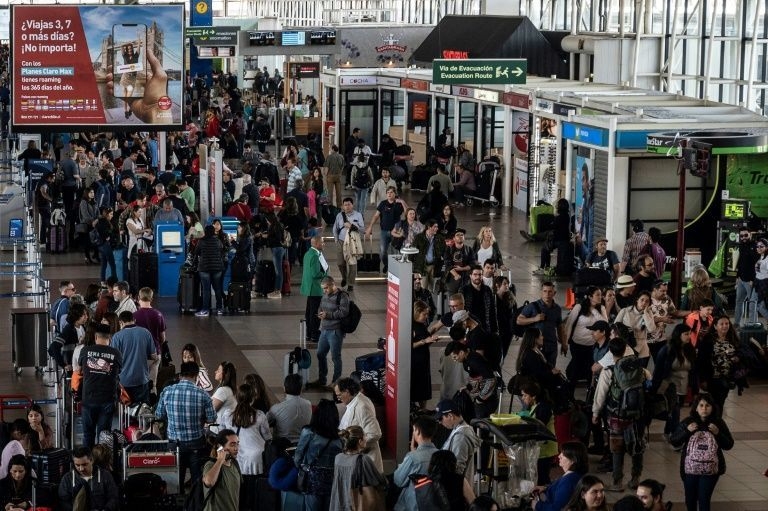Thousands stranded at Chile airport amid unrest

Perched on his large blue suitcase, back against a wall and staring vacantly into space, Henrry Martinez resigned himself to the wait.
The 50-year-old thought he’d left civil unrest behind when he quit Venezuela’s economic and political crises to seek a new life in Chile.
But no sooner did he arrive at Santiago airport than he found himself blocked due to similar chaos to that which he left behind.
Protesters clashing in the streets with security services who responded with tear gas and water cannons.
Looting, vandalism, deaths and even the military deployed.
An extended 7.00pm to 6.00 am curfew Sunday – the second consecutive night of curfews – left Martinez and thousands more stranded in the airport.
“I’ve had this experience in Venezuela so I’m fearful,” Martinez told AFP, his eyes betraying a mixture of resignation and anxiety.
“Security is worth more than everything,” he added. Waiting “one more night won’t make a difference.”
He’d already been through a lot just to get to Chile, travelling from his home town of Ciudad Bolivar in the east to Cucuta in Venezuela’s west, on the border with Colombia.
He travelled on to Colombia’s capital Bogota before boarding a flight to Santiago, paying US$300 for the privilege – a hefty sum for Martinez.
He’d heard there was trouble at his destination, but said he had no choice but to go on.
“In Venezuela the situation is critical,” he said. “It’s hard to live there, it’s not easy. Like me, thousands of Venezuelans are emigrating.”
Unlike Martinez, waiting to leave the airport to head into Santiago, thousands of other passengers lay strewn all over the airport hoping to fly home.
Dozens of flights were cancelled leaving travellers in limbo, queueing for food and information.
Many had set up makeshift beds against the walls all over the airport, laying out towels, jackets and sheets to sleep on.
Others had stretched out over a line of trolleys and luggage, while some had procured blankets from airport authorities to keep warm.
“We’ve come here because of the curfew,” said 23-year-old Peruvian student Yamile Sanchez.
She was part of a group of more than 100 students from 10 countries attending a week-long summit on forest science.
They didn’t want to take the risk of being stuck somewhere unable to get to the airport so travelled there early, with the curfew beginning at 7.00pm.
“We don’t know anything, when they cancel (the flights) we have to stand in huge queues to find out what’s happening.”
One after another, they saw their flights delayed.
Region-wide airliner LATAM cancelled all flights between 7.00pm and 10.00 am. Many airline and airport staff had been unable to get to work due to the troubles, which saw public transport grind almost to a complete halt.
“We’re worried because we don’t know if the protests will get worse or how long they’ll last,” said Sanchez.
“We’re university students, we’re missing classes.”
Marcos Montes, from Ecuador, had already been waiting 12 hours but was told he and his wife would have to hang around for almost another 24 hours before they could leave.
They had come 1,000 kilometers up to Santiago from the port city of Puerto Montt, where they saw a lot of burning and destruction, leaving them eager to go home.
They thought they’d left civil unrest behind in Ecuador when they went to Chile on holiday – earlier this month their country saw 12 days of protests against fuel hikes that left eight demonstrators dead.
“It’s very similar. We left Ecuador with problems and came here to find problems,” said the 46-year-old.
“More than fear we had a feeling of insecurity, not knowing if we could fly or not and finally it was cancelled.”
Using two trollies they created a little den for themselves, backs against a wall, hunkering down for the long wait.
Despite the difficulties, there was an air of calm in the Santiago International airport.
The queues were orderly, while most passengers had either found seats or a patch of floor to sleep on.
It was mostly silent but for one group of young women playing cards and a sports team sporadically letting out bursts of laughter. - AFP
